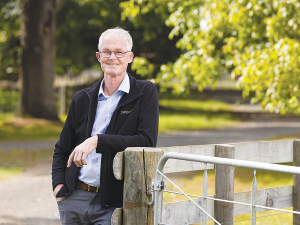Genetics, Efficiency and Performance: How the Burgesses are raising the bar at Te Poi
Bill and Michelle Burgess had an eye-opening realisation when they produced the same with fewer cows.
 DairyNZ chair Jim van der Poel says they want ETS legislation changed to take that pressure off farmers.
DairyNZ chair Jim van der Poel says they want ETS legislation changed to take that pressure off farmers.
DairyNZ chair Jim van der Poel says they are waiting patiently for the new government to be formed so they can discuss with them key issues of particular concern to the dairy industry.
He says one of these is the Emission Trading Scheme (ETS), which is saying that agriculture will be a part of this scheme come 1 January 2025. Van der Poel says they want this legislation changed to take that pressure off farmers and so DairyNZ can work constructively on what NZ contribution will look like.
“We are keen to have a constructive discussion with the new government on that,” he says.
Van der Poel says his organisation wants a change to the immigration settings which don’t work well for the dairy sector. He says the present freshwater reforms are also a big problem and says a lot of pressure is on regional councils to get these done by the end of next year.
“Already we can see that councils are under so much pressure from a timeline point of view, and this is an issue.
“There is the potential risk that in their haste to get these completed, some of their decisions won’t necessarily be science based and in the end may have to be relitigated in the future. We are seeking to get a longer time frame so that we’ll end up with better plans,” he says.
DairyNZ says it fully supports the commitment of the incoming government to abolish the present RMA. But van der Poel says DairyNZ would like to get a headsup on what the replacement legislation might look like and to have a constructive discussion with the incoming government on the shape of any new law.
With NZ signing the Paris Accord, van der Poel says we have to meet certain obligations, but DNZ want to be sure they will end up with things that they agreed to in the past. He says they want the ETS expanded to include other forms of vegetation that are sequestering carbon. He also says farmers need to know their number at a farm level; once they get that, there will be behavioural change.
The other issue that remains uncertain for farmers is the outcome of the Climate Change Commissions review of targets. Van der Poel says getting clarity on that would be good so that farmers know what’s ahead of them.
In the meantime, it’s a case of waiting for a new government to be formed, portfolios allocated and then ministers getting briefings from their departments and industry organisations such as DairyNZ.
Registrations are now open for the 2026 Ruralco Golf Classic, with all proceeds from the event set to support the Mid Canterbury Rural Support Trust.
Mating wrapped up last month at the across-breed Beef Progeny Test on Pāmu’s Kepler Farm in Manapouri.
Libby Judson is a keeper of memories from an age gone by. Tim Fulton tells her story.
A New Zealand-first native tree study has highlighted the Bioeconomy Science Institute's position as a forestry research leader.
Hemp fibre processor Rubisco is relocating its core processing facility to Ashburton as part of a $20-$30 million expansion to leverage what it says is an accelerating global demand for sustainable and renewable fibres.
Tradition meets some of the latest in technology at the 2026 East Coast Farming Expo.